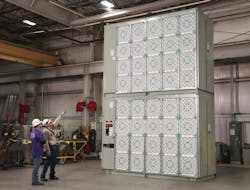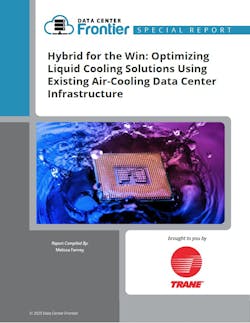This concludes our article series on implementing hybrid liquid cooling solutions to navigate the complex interplay of AI, sustainability and operational efficiency. This week, we’ll discuss the cost implications and return on investment of a hybrid cooling approach and share tips for selecting a trusted advisor.
Adopting a hybrid cooling approach has significant cost implications compared to a full liquid cooling migration. Hybrid cooling can deliver a positive return on investment (ROI) by reducing energy costs, increasing compute density, and improving sustainability. While the initial investment in liquid cooling infrastructure can be substantial, the reduced energy consumption and increased compute capacity can offset these costs over time.
Financial incentives and regulatory benefits may also encourage the adoption of hybrid cooling solutions. For example, some governments offer tax breaks or rebates for data centers that implement energy- efficient cooling technologies. In addition, heat recovery can lead to significant cost savings by reducing the need for traditional heating systems.
Hybrid cooling can deliver a positive return on investment (ROI) by:
- Reducing energy costs: Liquid cooling is generally more energy-efficient than air cooling, particularly at high densities. By using liquid cooling for high-density zones, data centers can significantly reduce their overall energy consumption. This efficiency gain translates directly to lower operational costs, as less power is required to maintain optimal temperatures for high-performance computing equipment.
- Increasing compute density: Liquid cooling allows for higher rack densities, which translates to more compute power in the same physical space. This can lead to increased revenue and reduced capital expenditures for new data center construction. By maximizing the utilization of existing space, data centers can postpone or eliminate the need for costly facility expansions.
- Improving sustainability: By reducing energy consumption and water usage, hybrid cooling can help data centers meet their sustainability goals and reduce their environmental impact. This improved sustainability profile can lead to additional benefits, such as compliance with environmental regulations, enhanced company reputation, and potential access to green financing initiatives.
- New revenue streams: Hybrid cooling solutions, particularly those involving liquid cooling, enable efficient heat recovery. This recovered heat can be repurposed for various applications, such as district heating or agricultural uses, potentially creating new revenue streams or offsetting other energy costs.
Selecting a Trusted Advisor
Trane® offers a powerful portfolio of data center solutions and services, backed by decades of experience and a deep understanding of data center design, development and operational challenges. As a trusted advisor, Trane works closely with data center operators to develop and integrate customized cooling systems with solutions that meet their specific needs, with a product portfolio that includes:
- Chillers: Trane® offers a wide range of air- and water- cooled chillers up to 3 MW, that are designed for energy efficiency and reliability.
- CDUs (including the 1 MW CDU): Trane’s CDUs are designed to efficiently distribute coolant to liquid- cooled servers. The 1 MW CDU offers a high-capacity solution for data centers with demanding cooling requirements.
- Air Handling: Trane’s Fan Coil Wall platform is engineered to maintain precise temperature and humidity in server rooms to help improve overall cooling efficiency.
- Chiller Plant Control: Trane’s system seamlessly integrates with equipment allowing for easy system configuration and customization.
- Services: Trane’s network of over 6,000 data center- trained technicians, available 24/365, are committed to uninterrupted equipment and system operation helping to enable peak performance.
Hybrid Cooling Requires a Commitment to Innovation
Trane is committed to innovating at the speed of now and can help meet challenges without fail. The company invests heavily in research and development to stay at the forefront of data center cooling technology.
Approaches to thermal management must be both holistic and forward-thinking. Rather than viewing cooling solutions in isolation, Trane seeks out synergies between system design, equipment, data analytics, and predictive maintenance. This comprehensive perspective allows the development of solutions that not only cool efficiently but also contribute significantly to overall data center sustainability. By minimizing environmental impact, cooling innovations such as these help data centers meet increasingly stringent, and necessary, sustainability goals while optimizing performance.
Trane’s global reach is matched by its commitment to local expertise and service. With air-cooled and water-cooled chillers available across all regions, and fan coil walls offered in multiple sizes, Trane ensures that data centers worldwide have access to state-of- the-art cooling solutions. With product lines that are continuously expanding, the company is responding to the evolving needs of the industry. The combination of global presence and local knowledge allows Trane to bring unparalleled expertise and support to every data center project, regardless of location or size.
Embracing the Hybrid Future
Hybrid cooling represents a practical and sustainable solution for data centers facing increasing cooling demands. By combining the strengths of both air and liquid cooling, data center operators can achieve a balance between performance, cost, and sustainability. In a rapidly evolving landscape, flexibility, adaptability, and sustainability will be key to long-term success. The data center of the future will be one that can adapt quickly to changing workload demands, minimize its environmental impact, and operate efficiently and cost- effectively.
Download the full report, Hybrid for the Win: Optimizing Liquid Cooling Solutions Using Existing Air-Cooled Data Center Infrastructure, featuring Trane, to exclusive content on financial incentives and regulatory benefits or to learn more.




